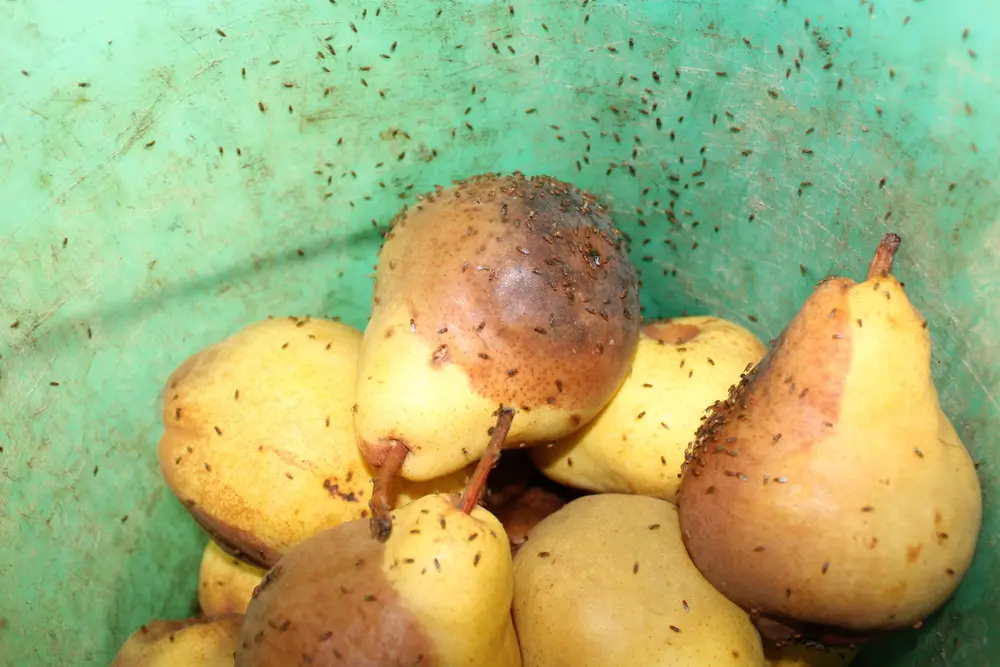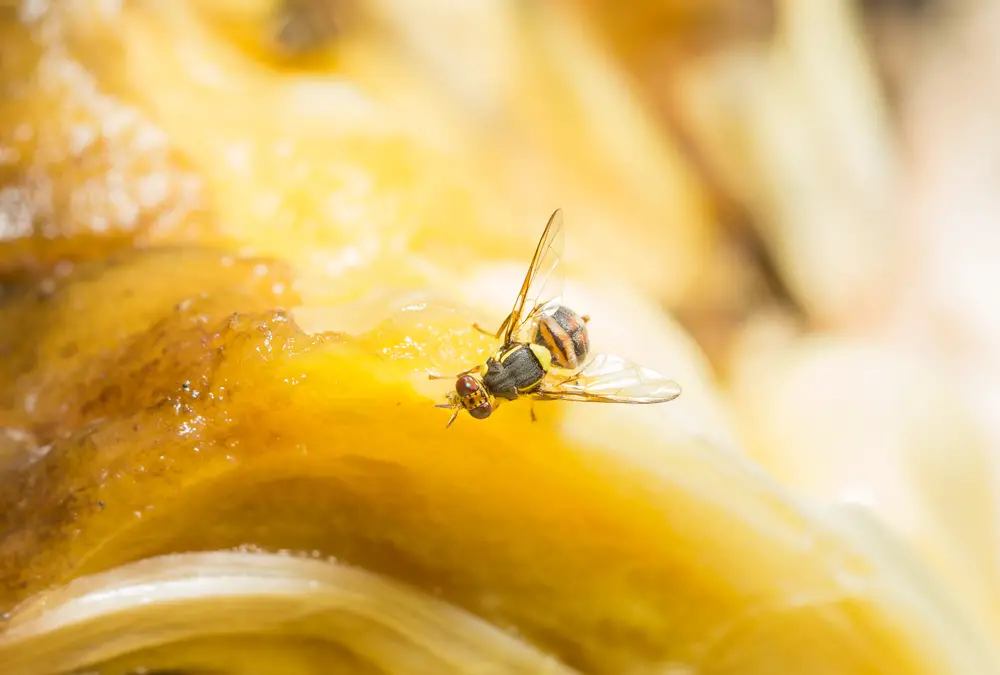Fruit flies can often be a pesky issue in our homes, especially during the warm summer months when they seem to multiply rapidly.
These tiny insects are drawn to ripening fruits and vegetables, making our kitchens the perfect environment for them to thrive.
Quick Answer:
Yes, fruit flies would likely die in the fridge due to the cold slowing their metabolism, leading to death. However, using a fridge to control an infestation is impractical. Proper food storage and cleanliness are more effective.
Fruit Flies in the Fridge

Identification and Behavior
Fruit flies, also known as Drosophila melanogaster, are small insects that are attracted to ripe and overripe fruits. They can be easily identified by their size, between 2-4 millimeters long, their red eyes, and the way they hover and move around fruits.
They possess a keen sense of smell and are attracted to the fermentation process that occurs in fruits. Their common sources of food are fruits, vegetables, and other decaying organic materials.
Storing fruits in the fridge can change the behavior of fruit flies. In a cooler environment, they tend to become less active and reproduce at a slower rate. This, in turn, helps in straightening the focus towards controlling their presence in your fridge.
Lifespan of Fruit Flies
Fruit flies have different stages in their life cycle – eggs, larvae, pupae, and adults. In general, their lifespan depends on temperature, humidity, and availability of food sources.
However, by placing infested fruits inside the refrigerator, it can help curb their development and even cause them to die.
When fruit flies are exposed to temperatures below 40°F (≈4°C), it can interrupt their life cycle, as follows:
- Eggs: Most eggs won’t hatch or might face developmental issues.
- Larvae: Larval development slows down or can stop completely, even causing them to die.
- Pupae: Some pupae can die, while others might go into a dormant state; however, once the temperature rises, they may still emerge as adults.
- Adults: Eventually, adults are more susceptible to cooler temperatures, and many can die in the fridge.
However, refrigerating the fruits won’t guarantee that all fruit flies die instantly. It takes time for their life cycle to be disrupted and to decrease their population size.
It is essential to maintain proper hygiene in and around your fridge and adopt preventative measures in the long run.
Preventing Infestation
Keep the Fridge Clean
Maintaining a clean fridge is essential to prevent fruit fly infestations. Regular cleaning helps eliminate food remnants that attract fruit flies. Scheduling weekly cleanings and promptly wiping spills can be beneficial.
Don’t forget to clean the fridge’s edges, bottom, and shelves too. Recycling bins and food disposal areas should be kept clean to avoid attracting fruit flies.
Fruit Storage Solutions
Proper fruit storage is crucial in preventing fruit fly infestations. Make sure to store your fruits and vegetables in sealed containers or tightly wrapped in plastic when not at room temperature to consume.
Avoid overripe or damaged fruits, as they can attract fruit flies. Alternatively, fruits that do not require refrigeration can be stored in mesh bags, which allow air circulation while keeping fruit flies out.
Sealing Doors and Vents
Fruit flies can enter the fridge through small gaps around doors and vents. To prevent this, regularly inspect your fridge’s door gasket for damage and ensure it forms a tight seal.
Replace worn-out gaskets and ensure doors close properly. Also, check vents and windows for any gaps or damages and install screens to prevent fruit flies from entering your home. Sealing doors and vents effectively reduces fruit fly infestations in fridges.
Cleaning Solutions
Maintaining a Clean Environment
It’s essential to keep your kitchen clean to prevent fruit flies from thriving. Maintaining a clean environment involves regular cleaning of surfaces, storing food properly, and addressing any spills promptly.
- Wipe surfaces: Clean countertops, cutting boards, and appliances regularly to remove residue and food particles that may attract fruit flies.
- Store food: Ensure perishable food is adequately sealed and stored, either in containers or in the refrigerator.
- Address spills: Clean up spills immediately, especially ones involving fruits, juices, or other sugary substances.
Freezing and Defrosting
Fruit flies can be killed at cold temperatures, and keeping your fridge and freezer clean is essential in addressing fruit fly infestations.
Freezing can also help preserve food and prevent spoilage that might attract fruit flies.
- Organize your freezer: Make sure your freezer shelves are kept organized and items are secured to minimize spills or leaks.
- Cold temperatures: Keep your fridge and freezer at appropriate temperatures (below 40°F/4.4°C for the fridge and 0°F/-18°C for the freezer) to help kill fruit flies and prevent them from reproducing.
- Defrost periodically: Defrost your freezer on a regular basis to address any moisture build-up and help maintain optimal temperature. This process involves turning off your freezer, emptying its contents, and waiting for ice to melt and evaporate.
- Clean shelves: Both fridge and freezer shelves should be cleaned periodically, either with mild soap and water or a cleaning solution approved for use in food storage environments. This ensures all possible residues and debris are removed, and fruit flies have no place to breed.
Dealing with Existing Fruit Flies

Using Traps
Creating simple homemade traps can be an effective way to catch and get rid of fruit flies. You can use a mixture of vinegar, sugar, and a drop of dish soap in a small container.
The smell of vinegar and sugar will attract the flies, while the dish soap reduces surface tension, causing them to drown. Another trap option is to use a piece of rotting fruit in a jar with a paper funnel. The flies, attracted by the smell of rotten fruit, will enter the jar but will be unable to fly back out.
Eliminating Breeding Spaces
Fruit flies lay their eggs in moist areas where rotting food is present. To prevent them from breeding, you should clean your kitchen and remove food scraps that could be potential breeding sites.
Pay special attention to your garbage disposal, as it can be a breeding ground for fruit flies. Make sure to clean it regularly to avoid buildup of rotting food. Also, wash your produce immediately after purchasing it to remove any eggs or fly larvae that might be present.
Discarding Infested Produce
Inspect your fruits and vegetables for any signs of fruit fly infestation. If you find rotten produce, dispose of it immediately in a sealed bag and remove it from your home.
This will not only eliminate their breeding space but also help stop the spread of the infestation to other fruits and vegetables. Remember to keep your remaining produce stored properly to minimize the chances of future infestations.
Fruit Flies Outside the Fridge
Fruit flies are small pests that might find their way into your home and swarm around your kitchen, fruit bowl, or refrigerator. It’s essential to understand their behavior and take preventative measures to keep them at bay.
Fly-Proofing Your Home
First and foremost, maintain cleanliness in your kitchen. Fruit flies are attracted to overripe fruit, compost, and damp mops, so be diligent in disposing of waste and keeping these items away from your living space.
To prevent fruit flies from entering your home, seal gaps and cracks around windows, doors, and vents. Installing insect screens on windows is an effective way to keep them out.
Also, avoid leaving doors and windows open for extended periods, especially during warmer months when fruit flies are most active.
Alternative Insect Pests
Fruit flies are tiny, but they’re not the only small insects that can invade your home. It’s crucial to differentiate between fruit flies and other pests, such as gnats, to apply the proper prevention and control methods.
Gnats: These small insects resemble fruit flies and can be found around moist areas like drains, houseplants, and trash bins. While they might not be attracted to overripe fruit, gnats share many habits with fruit flies, and controlling them involves similar measures like cleanliness, sealing gaps, and using insect screens.
Conclusion
Fruit flies, scientifically known as Drosophila melanogaster, are a common household pest.
While refrigerating fruits and vegetables may not completely eradicate fruit flies, it can considerably reduce their population and activity.


